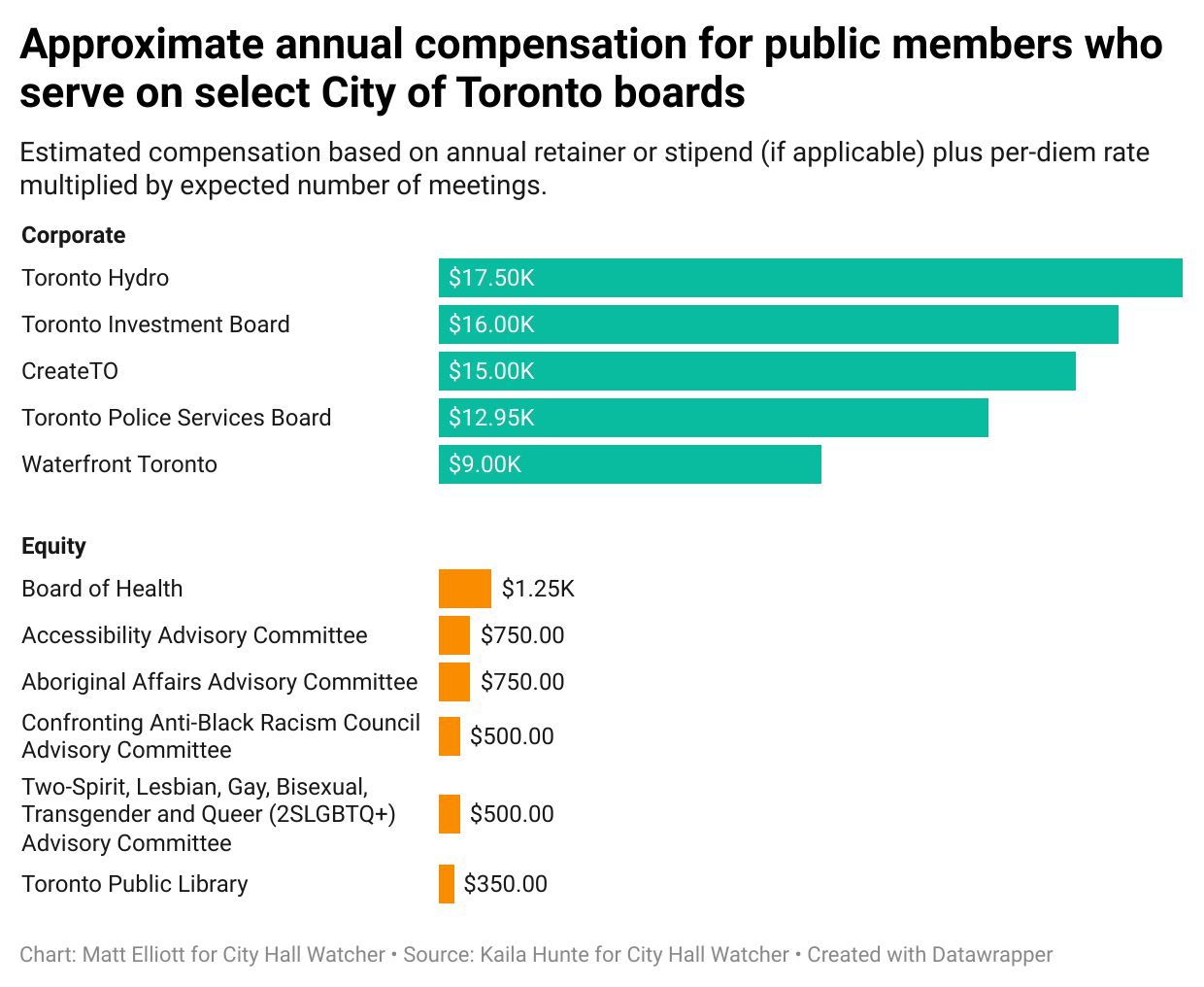What's equity worth at Toronto City Hall?
City Hall Watcher #212: Contibutor Kaila Hunte looks at who gets paid — and who doesn't — for their work advising City Hall. Plus: alarm bells around reserve funds.
Hey there!
January is almost over, and with that comes the looming end of municipal budget season. I’ll be sad to pack up my spreadsheets, but don’t worry — there’s always another budget right around the corner.
This week, we’ve got a contribution from writer Kaila Hunte. Kaila’s done some digging on the compensation rates for serving on the City’s various advisory boards and agencies and found that while some positions are pretty lucrative, others are… less so. If you believe government spending reflects priorities, there’s a conclusion you’ll be able to draw from this one.
Also: I’ve taken a look at Toronto’s Reserve Funds! The City has done a good job of protecting them for years, but the 2023 budget looks to be the start of a strong downward trend. I made a chart. Of course.
Thanks for reading!
🍼🍼🍼 For those also interested in my being-a-dad chronicles, I’ve got a new update over on the DadBlog. Look at all that cake.
— Matt Elliott
@GraphicMatt / graphicmatt@gmail.com / CityHallWatcher.com
Read this issue on the web / Browse the archives / Subscribe
What Toronto City Hall pays for civic involvement
By Kaila Hunte
Given that I have been eating, sleeping, and breathing municipal politics for the better part of the last nine months, it was no surprise when I was bombarded by advertisements from the City to apply for one of Toronto’s publicly appointed boards, tribunals, and committees.
“Serve your City,” the ad said, but what it didn’t say was how much a public member would be compensated for their time, effort, insight, and expertise — or if a public member would be compensated at all.
What transpired after that targeted ad reached my phone was a days-long data dive into the compensation (or lack thereof) for every single board, committee, and tribunal at the City of Toronto.
Toronto has 51 boards, tribunals, and committees which cover everything from reviewing cases of dangerous dogs to determining the strategic plan, operating and capital budgets for the Toronto Transit Commission (TTC), the Toronto Police Service (TPS), the Toronto Community Housing Corporation, and more. At the time of my research, there was no easily accessible dataset that outlined exactly which members were compensated, why, or by how much. So, I made one. The resulting data table was, to put it simply, disappointing but not at all surprising.
Taking the top spot for compensation is the Chair of the Toronto Police Services Board with an annual retainer of $90,963.00 annually — that position is currently occupied by interim Chair Ainsworth M. Morgan.
Toronto Hydro, CreateTO, the Toronto Investment Board, and the Toronto Local Appeal Body round out the top five most highly compensated boards, all of which have an annual retainer of $50,000 or more for the chairperson position.
Conversely, equity committee members are paid $125.00 per meeting, with committees meeting on an average of about four times per year. Meetings are often long sessions, held during business hours. The pandemic has allowed for virtual participation, but previously many of these roles encouraged in-person attendance.
Given the time commitment, workload and scheduling of meetings, the pool of available applicants immediately starts to shrink exponentially — even before you consider the compensation.
Take the Accessibility Advisory Committee, for example. The City says it “provides advice to City Council on the elimination of barriers faced by people with disabilities and acts as a liaison with external bodies on barriers to participation in public life and to the achievement of social, cultural and economic well-being of people with disabilities. The committee also advises City Council about the requirements and implementation of accessibility standards and the preparation, implementation and effectiveness of accessibility reports as required by the Accessibility for Ontarians with Disabilities Act, 2005 (AODA).”
This is a very tall order for a committee where members are paid approximately $750 annually.
Similarly, the Confronting Anti-Black Racism Council Committee members are paid $125 per meeting and are tasked to “advise inter-government and institutional work on anti-Black racism in sectors such as education, child welfare, policing and the justice system, housing, and employment.” No biggie.
What is truly astonishing is that these committee roles are treated as part-time or even casual positions but require full-time, permanent funding and significant staffing levels to support this work.
Money continues to flow to the city’s corporate boards, many of which are populated by high earners in the chair or vice chair positions. In contrast, those boards tasked with making Toronto a safer, more accessible, more equitable, and more just place to live are continually asked to do more with less.
Toronto’s proposed 2023 budget does not attempt to increase the compensation for these members to even keep up with the rate of inflation, nor does it allocate the resources needed to achieve the goals of any of the equity committees.
The equity is in the details, and by City Hall’s estimation, it’s not worth all that much.
➡️ More: Municipal government expert Terra Loire has also collected data on compensation and put together this striking visual.
Kaila Hunte (she/her) is a lifelong Torontonian and works as an accessibility consultant and actor. She is also a community organizer and occasional campaign manager. You can find her on Twitter, TikTok, and Instagram @kailahunte. You can also email her at kaila@kailahunte.com.
Call for submissions
City Hall Watcher is looking for more contributions! If you’ve got an idea for some data analysis or reporting about your local government, get in touch with Matt. All contributions to this newsletter are paid.
Charted: Toronto’s declining reserve funds
A briefing note attached to this year’s budget shows something prudent financial planners never really want to see: the City of Toronto’s reserve funds for capital and operating projects are trending down.



